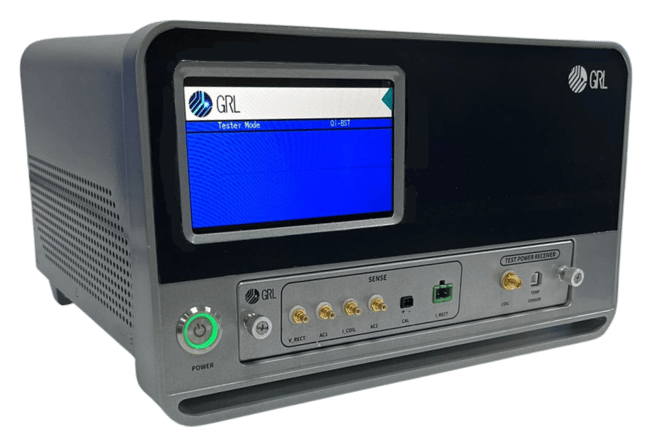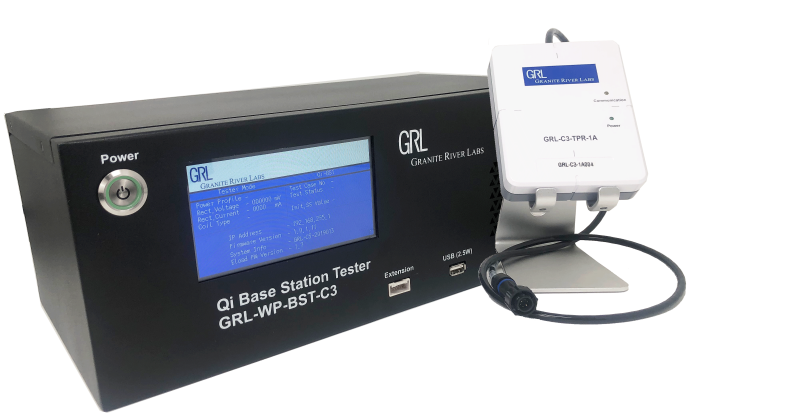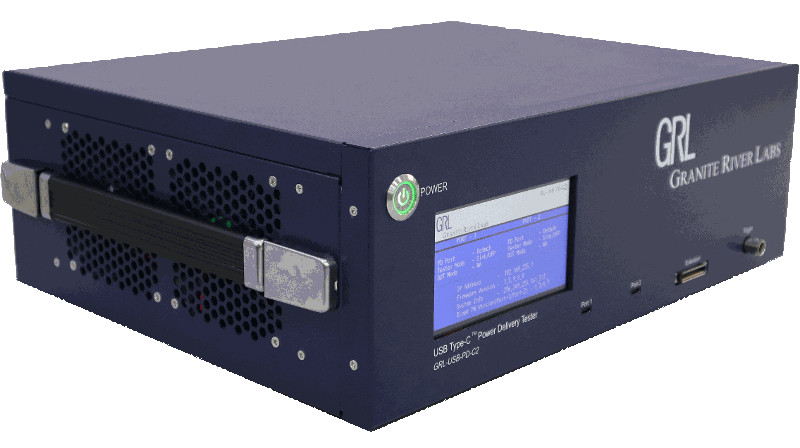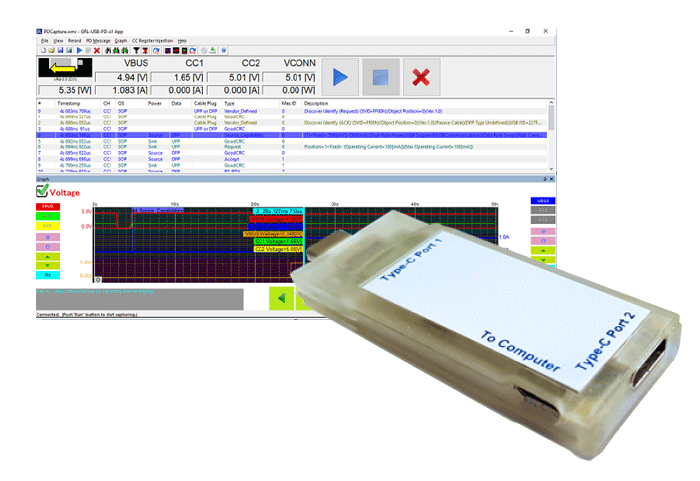GRL Qi Wireless Charging Transmitter tester (GRL-WP-TPR-C3) for BPP/EPP Power Profiles
Product Overview
The GRL-WP-TPR-C3 is the world’s first cost effective and user-friendly Qi wireless charging compliance test solution that enables product developers to automatically run all Wireless Power Consortium (WPC) mandated tests of Qi wireless charger power profiles as BPP and EPP — all at the push of a button.
Solution accessories
Boasting all the accessories required for Qi wireless charging compliance testing, including power coils, a thermocoupler, Foreign Object Detectors (FOD), and an automation software that expedites the compliance and debugging process, the GRL-WP-TPR-C3 is ideal for all Qi-related R&D, compliance testing, and design purposes.
GRL-C3 simplifies wireless charging compliance tests by offering two configurations to support Baseline Power Profile (BPP) up to 5W and Extended Power Profile (EPP) up to 15W. GRL-C3 also supports proprietary varieties of Qi wireless charging, providing flexibility for developers to quickly verify products following Qi standards.
Key features at a glance
- Test both BPP and EPP power profiles of Qi wireless base stations with a single instrument
- Supports all BPP tests up to Qi specification v1.2.4
- Supports Qi specification version 1.3 and 2.0 for BPP and EPP
- Comes with built in USB power supply for testing base stations that require 2.5W
- Full automation for the following processes
- Fast and accurate test execution
- Oscilloscope measurements
- API support for custom test cases
- Generation of comprehensive .pdf, .csv, and .xml test reports
- Both manual and automation modes available for compliance and R&D
- Intuitive Graphic User Interface (GUI)
- Offline analysis and debug with saved waveforms
- Automatically generates comprehensive
- Responsive worldwide technical support
Options & Accessories
The following optional accessories are available for manufacturers and developers who wish to test their products for compliance with the following legacy Qi wireless charging standards and power profiles:
- GRL-WP-TPR-C3-BP: GRL Qi Wireless Charging Transmitter Tester for BPP power profiles up to 5W (Qi 1.2.4)
- GRL-WP-TPR-C3: GRL Qi Wireless Charging Transmitter Tester for EPP power profiles up to 15W (Qi v1.3)
- GRL-WP-TPR-C3L: GRL WPC Qi Wireless Charging Transmitter Tester (C3 Starter Version)
- GRL-C3-TPR-COMBOL: GRL Qi Wireless Charging Base Station Testers for BPP (Qi 2.1, Qi2.0.1 and Qi 1.3.3) and MPP power profile (Qi 2.1 & Qi 2.0.1)
- GRL-C3-TPR-COMBO: GRL Qi Wireless Charging Base Station Testers for BPP & EPP (Qi 2.1, Qi2.0.1 and Qi 1.3.3) and MPP power profile (Qi 2.0.1, v2.1)
- GRL-C3-EP-COMBO: GRL Qi Wireless Charging Transmitter and Receiver Testers for EPP power profile (Qi 2.1, Qi 2.0.1 and Qi 1.3.3)
- GRL-C3-EP-MPCOMBO: GRL Qi Wireless Charging Transmitter and Receiver Testers for EPP power profile (Qi 2.1, Qi 2.0.1 and Qi 1.3.3), BPP Power Profile (Qi 2.1, Qi 2.0.1 and Qi 1.3.3), BPP Power Profile (Qi 2.1, Qi 2.0.1 and Qi 1.3.3)
- Factory calibration services are also available
- OEMs and manufacturers may also send their products directly to GRL’s test labs for Qi compliance evaluation and authentication. Our charging test solutions portfolio provides a full range of testing capabilities for wired and wireless technologies including USB Power Delivery and Qualcomm QuickChargeTM.
Need a solution for the latest Qi2 wireless charging standard? Check out our affordable, intuitive, and upgradable Qi2 compliance test solution, the GRL-C3-MP-TPR.
Download & Purchase
Contact GRL to request for a formal price quote or to schedule a personalized demo and watch the GRL-WP-BST-C3 in action.
Why is backwards compatibility with Qi 1.0 to 1.3 important?
Qi Version 1.3 was released as recently as 2021, when the global wireless charging market was valued at $5.48 billion. With sustainability awareness at an all time high among consumers, manufacturers of wireless charging devices will want to ensure backwards compatibility with Qi 1.3 and older so as to capture eco-conscious and late adopter sections of the market as well.
Qi wireless charging test components
Released in 2010, Qi 1.0 supported single coil, coil arrays, and moving coil designs to allow transmission of up to 5W of power. USB chargers were added to the equation in 2012, where Qi 1.1 upgraded the original specification by increasing the number of supported transmitter types to 12, giving rise to a greater variety of wireless chargers in the market. In addition, Qi 1.1 was the first time foreign object detection (FOD) was introduced for user safety.
In 2015, the Extended Power Profile (EPP) was introduced alongside Qi 1.2. This increased charging speeds to 15W and also introduced unique IDs and thermal tests to power receivers.
Markets with demand for wireless charging
Wireless charging has grown increasingly popular over the years, with the Nokio 920 being the first ever smartphone to feature built-in Qi wireless charging capabilities. By 2013, wireless chargers were already installed across 1,500 locations across the United States and a further 1,000 across Europe’s airports, hotels, restaurants, and cafes.
With a well-established customer base, wireless charging has grown from strength to strength over the last two decades, deployed across 2,700 types of products such as in-vehicle chargers, smartphones, and public spaces by 2018. The combination of inductive charging and magnetic resonance has proven to be a successful formula, and is projected to reach a total valuation of $34.65 billion by 2030.
Other Products

Automated Modular WPC Qi2 Wireless Charging Transmitter & Receiver Test Solution (GRL-WP-C3-MP-TPR & TPT)
The latest Qi2 wireless charging standard test solution designed to help OEMs keep up with ever-changing wireless charging standards without compromising on quality, convenience, or data security.
Download Datasheet
COPYRIGHT 2026 GRANITE RIVER LABS INC. ALL RIGHTS RESERVED.


